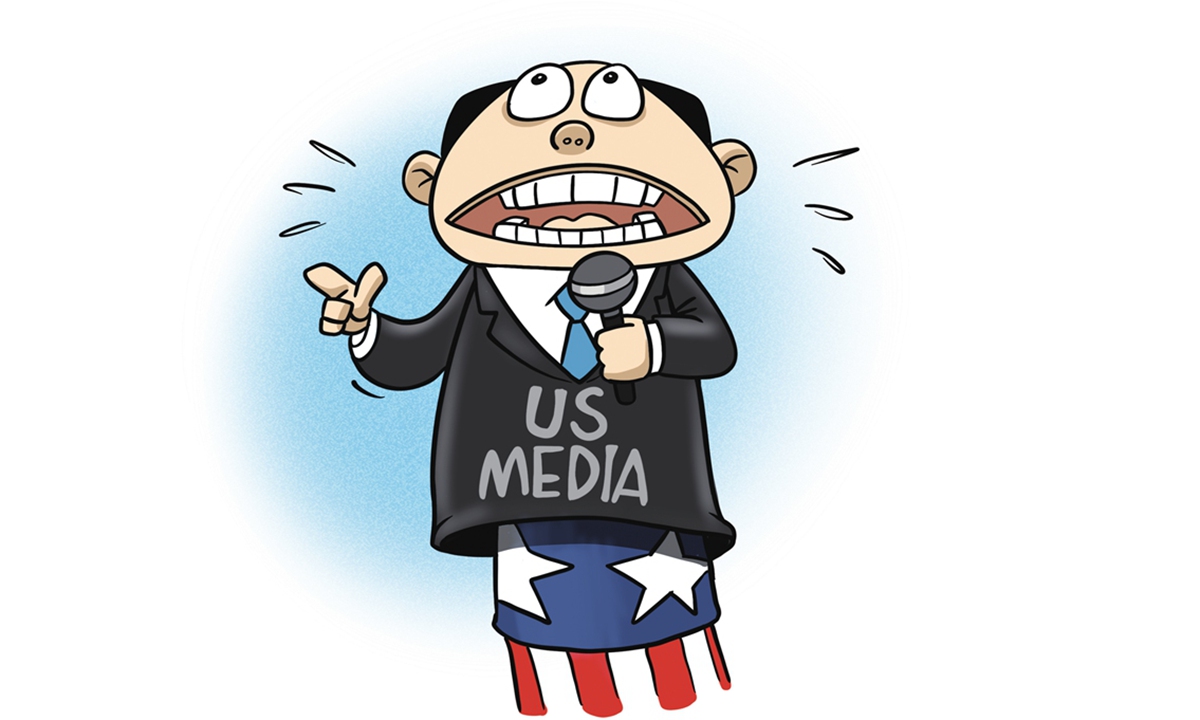VOA’s hype on ‘China-Australia competition over Solomon Islands’ a gimmick in Washington’s trouble-provoking playbook

Illustration: Liu Rui/GT
Several US government mouthpieces have been proactively helping their master is seeking to gain benefit from regional chaos and even conflict. The latest example is how the Voice of America is hyping the so-called China-Australia competition over the Solomon Islands to deliberately stir up trouble after Chinese and Australian high-ranking officials' recent visit to the South Pacific country.On Thursday, Australia's Foreign Minister Penny Wong, who was visiting its Pacific neighbor Solomon Islands, underlined Canberra's desire to deepen ties with Honiara. Meanwhile, Qian Bo, special envoy for Pacific Island Countries Affairs of the Chinese Government, paid a visit to the Solomon Islands from Tuesday to Wednesday and met with the country's new Prime Minister Jeremiah Manele.
It is likely a pure coincidence that these two visits happened one after another. Yet, the Chinese edition of the VOA, indulging in wild imagination and acting out of an ulterior motive, still managed to make a far-fetched connection between the two events, stating that China and Australia went "head-to-head for competing influence in the Solomon Islands" in a Thursday report.
This becomes even more ridiculous, considering that as time of publishing, no mainstream Australian media has made a similar connection it is a story online being pushed in the US, a country that has absolutely no business in the Solomon Islands' cooperation with China and Australia.
The so-called competition between China and Australia in the South Pacific region is a false proposition created by the distorted propaganda of the US. Washington cannot tolerate any possibility that could enhance China's influence in the region, because this will hinder its efforts to realize its strategic goals or interests in the region. And US media like VOA is a prominent accomplice of the US in helping to hype or even provoke geopolitical tensions in the region and in this case, exert political influence on the South Pacific region.
The US has long neglected the South Pacific after the end of the Cold War. It was only after the announcement of the Indo-Pacific Strategy that the US began to regard the region as a vital strategic base to contain and even deter China. The latest work of fiction from VOA is an attempt to marginalize and suppress China's presence in the South Pacific region.
The US is trying to push Australia to act as its battering ram while driving a wedge between China and the Solomon Islands. However, against Washington's will, it is unlikely that the Solomon Islands will become a battleground between Beijing and Canberra or even an obstacle to China-Australia relations.
China has always expressed its respect for the special and close relationships between Australia and the South Pacific island countries. It has opposed the possibility of cooperation with third parties in the South Pacific island countries. Meanwhile, the Australian Albanese government has shown rationality - significantly more than its predecessor under Scott Morrison - in relations with China, so it will not blindly follow the US to contain China.
Moreover, there already are successful stories of China-Australia cooperation in the South Pacific. For example, the cooperation between China and Australia on malaria control in Papua New Guinea has been a successful partnership, which proves that Beijing and Canberra can work together in the region and make a meaningful contribution to the promotion of local people's livelihoods and the improvement of regional country's development, be it economic or health. By the same token, a trilateral or multilateral regional cooperation based on mutual respect between China, Australia and other South Pacific countries, including the Solomon Islands, can also come true.
China has no intention to compete with Australia or any other countries in the Solomon Islands or the South Pacific region. Australia should also be wary of going back to the dangerous approach of viewing China as a rival. Joining hands as real partners, the two countries can play a positive role in the South Pacific region's development.
